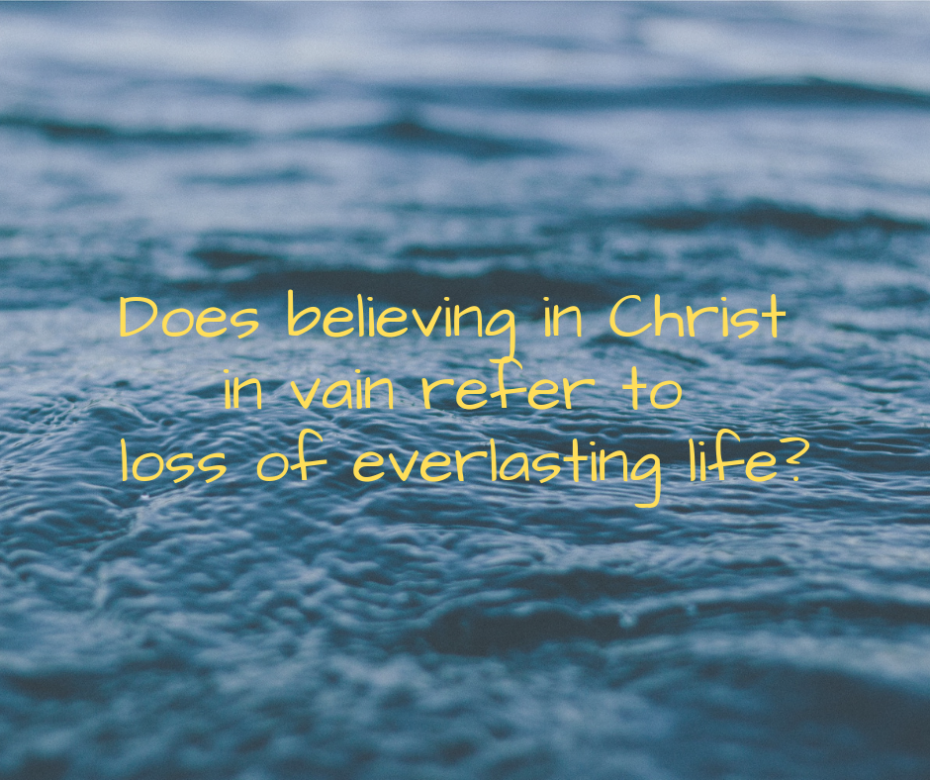I received the following question in a comment to a blog I wrote: “Why does Paul say you can believe in vain, 1 Cor. 15:2?”
The questioner doesn’t seem to believe in eternal security. He implies that Paul was saying that you could believe in Christ, be born again, and then end up going to Hades anyway because the belief proved to be in vain due to a failure to persevere in faith or good works.
In real estate, the three keys are location, location, location. In hermeneutics, Bible interpretation, the three keys are context, context, context. The answer to this question becomes apparent when we look at the context.
Various chapters in the Bible are known by one-word descriptions. We all know that the love chapter is 1 Corinthians 13. The repentance chapter is Luke 15. The faith chapter is Hebrews 11. The Millennium chapter is Revelation 20. And the resurrection chapter is 1 Corinthians 15.
In 1 Cor 15:12 Paul says, “some among you say that there is no resurrection of the dead.” In v 14 he writes, “And if Christ is not risen, then our preaching is empty, and your faith is also empty.” In vv 17-19 he says, “And if Christ is not risen, your faith is futile; you are still in your sins! Then also those who have fallen asleep in Christ have perished. If in this life only we have hope in Christ, we are of all men most pitiable.”
Verse 2 is parallel to vv 14 and 17-19. If Christ did not rise from the dead, then belief in Him is in vain, empty, futile, pitiable. There is no everlasting life if there is no resurrection of the dead.
This understanding of 1 Cor 15:2 is recognized by many commentaries. The following are a few examples:
To reject bodily resurrection eviscerated “the gospel” and made faith vain (eikē, “without cause” or “without success”; cf. vv. 14, 17) because it had an unworthy object (cf. 15:13, 17).
—Dave Lowery, 1 Corinthians in BKC, p. 542.
…if their current position as to “no resurrection” is correct, then Christ did not rise, which in turn means that they did indeed believe in vain. If they are right, everything is a lie, and they cease to exist as believers altogether.
—Gordon Fee, First Corinthians, p. 721.
Condition of first class, unless in fact ye did believe to no purpose (eikēi, old adverb, only in Paul in N. T.). Paul holds this peril over them in their temptation to deny the resurrection.
—A. T. Robertson, Word Pictures, s.v. 1 Cor 15:2.
If, as the errorists in Corinth taught, there is no resurrection, Paul says, v. 14, our faith is vain; it is an empty, worthless thing. So here he says, the gospel secures salvation, unless faith be of no account.
—Charles Hodge, First Corinthians, p. 312.
I should note in closing that I do not agree with the view of many commentators that the words “by which also you are saved, if you hold fast the word which I preached to you” refer to regeneration and the so-called doctrine of the perseverance of the saints. The words you are saved are in the present tense. More literally it says, by which you are being saved…
Contrast 1 Cor 15:2 with Eph 2:5, 8 and the words “you have been saved.” Both are passive voice. But the former is the present tense, and the latter is perfect tense. The latter looks at regeneration. The former does not.
The present tense salvation in 1 Cor 15:2 is sanctification, being spiritually healthy, as it is in 1 Cor 3:15 and 5:5 (though those two refer to being found spiritually healthy at the Bema). In order to be spiritually healthy, believers must hold fast to the gospel message, the good news that Jesus died on the cross for our sins, was buried, rose from the dead, and appeared to many witnesses (1 Cor 15:3-11). That the Lord’s Supper is a central part of Christian worship underscores this point.
Dwight Hunt writes:
Furthermore, it is the gospel by which also [believers] are saved, if [they] hold fast that word. This statement stresses the fact that the gospel includes more than justification, which brings forth eternal life; it also includes a daily sanctification (are saved) if believers hold fast (or abide in) the word (cf. John 8:31–32; Rom 1:15; 10:9; 1 Cor 15:2; Gal 2:20; Eph 2:10; Jas 1:21). This daily sanctification process relates to the quality of life the Christian will spend in eternity (3:9–15; Luke 19:11–27; Rom 8:16–17; 2 Pet 1:10–11).
—Dwight Hunt, First Corinthians in TGNTC, p. 758


